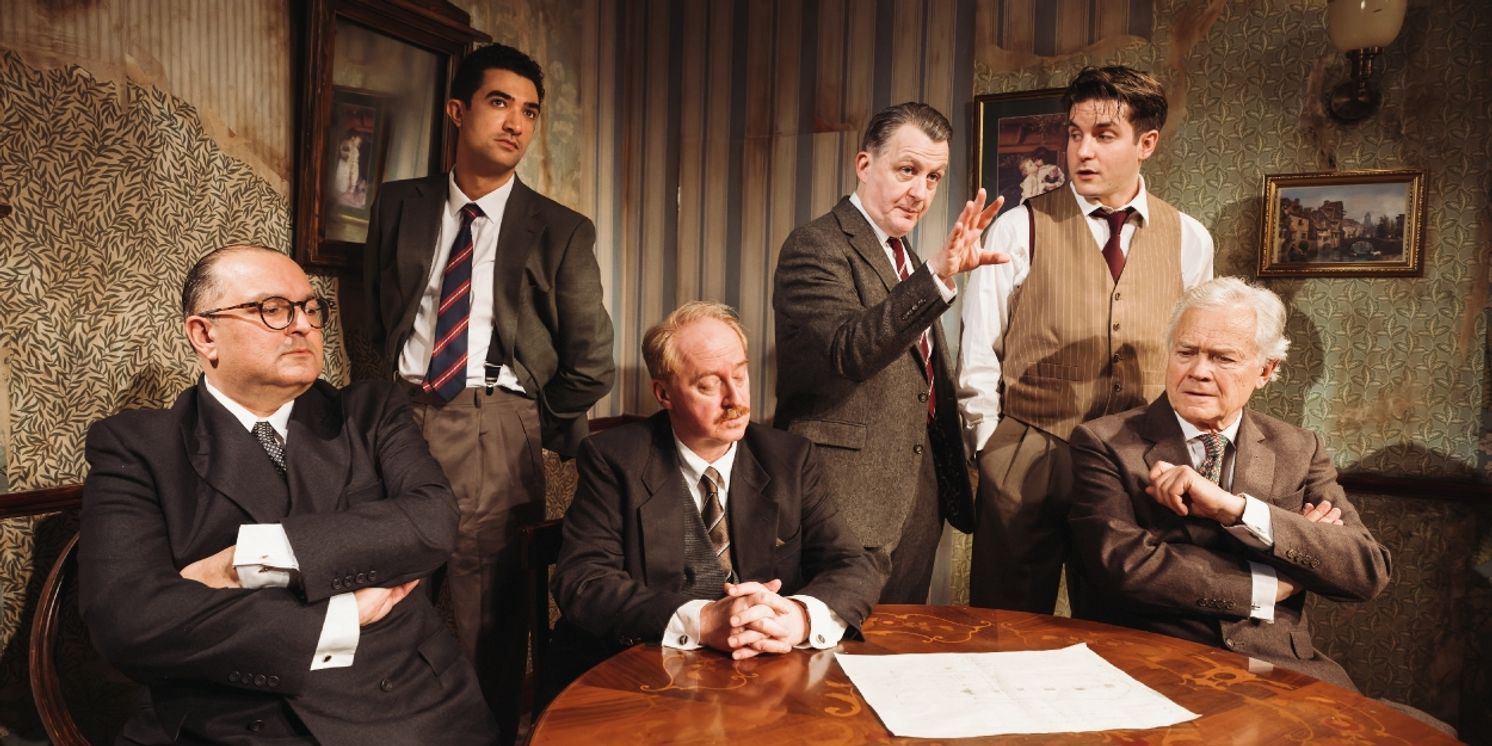Review: FARM HALL, Jermyn Street Theatre
This excellent debut play with a provocative philosophical background explores the consequences of the German research on the atomic bomb.

![]() After Hitler's death and the German defeat, the Führer's top nuclear scientists are being held in the English countryside while the Pacific continues. With nothing to do but read redacted newspapers, skim through familiar books, and write censored letters, the six men wallow in their boredom, unaware that they're being recorded.
After Hitler's death and the German defeat, the Führer's top nuclear scientists are being held in the English countryside while the Pacific continues. With nothing to do but read redacted newspapers, skim through familiar books, and write censored letters, the six men wallow in their boredom, unaware that they're being recorded.
The events and conversations that unfolded at Farm Hall between July 1945 and January 1946 were translated and eventually declassified in 1992, becoming the root of Katherine Moar's debut play. It premieres at Jermyn Street Theatre directed by Stephen Unwin.
It follows Erich Bagge (Archie Backhouse), Kurt Diebner (Julius D'Silva), Otto Hahn (Forbes Masson), Werner Heisenberg (Alan Cox), Max von Laue (David Yelland), and Carl Friedrich von Weizsäcker (Daniel Boyd) in a surprising black comedy with a terrific cast and a provocative philosophical background. While Moar's moral judgement is curiously slight, she explores their remorse - or lack thereof - with subtle, thin humour, creating a grey area where the men speculate where they'd drop their own atomic bomb, describe its effects with horror and fascination, and make wartime metaphors out of John Wayne films almost in the same breath.
After a preamble where they rehearse Blithe Spirit, gossip about their capturers-slash-defenders, and tease one another, once the Americans hit Japan, Moar finally tackles ethics. While the start of Farm Hall feels a bit like a 1940s Big Brother house without the scandals and forced dramatics of wannabe celebs, it's beautifully written. A sophisticated use of language and Unwin's meticulous visual direction add movement to an otherwise very still situation. A series of verbal tennis matches ensue on Ceci Calf's stunning set. Against peeling wallpaper and a gorgeous fireplace, their chit-chat reveals their fears and culminates with a frantic search for a caveat or a scapegoat that might allow them to come out of their accusations unscathed and free to continue their research without consequences.
They attempt to spin the moral implications of their actions in a positive way, analysing the relationships between responsibility and shame as well as the regrets that accompany the excitement for scientific research. Their veiled rivalry comes out in full force when they find out that the Americans succeeded where they failed. The dynamics between the characters are striking examples of male ego, arrogance, and competition, but, ultimately, they're all the same man with slight variations of the same personality. It's the actors who portray them who make them truly compelling.
Cox brings a pensive, reserved presence as Heisenberg. It's a quiet storm of a performance that pierces through with scene-stealing flair. He is in direct opposition to D'Silva as the boisterous, ire-prone Diebner. Masson and Yelland deliver the two most sentimental and soft-spoken figures, with Masson being an increasingly more tortured soul after the news. There's virtually no difference in the staged age gap, so Backhouse and Boyd come off simply as younger versions of the others.
Boyd delivers, however, probably the most faceted portrayal. With witty dialogue and clockwork comic timing, his role is of a privileged and unremorseful up-and-comer. Backhouse's Bagge acts as a comparison to all of them. A Nazi party member out of need due to his working class background, he maintains his guiltless position and refuses to admit any part in the genocide. While Moar doesn't necessarily condemn any of them directly, she comes at them through their own reflections on the lost contributions of Jewish men of science and sly comments that might go undetected under pure wit.
The pace of the piece has its peaks and valleys, but the 90-minute breakless production flows effortlessly, all things considered. A voiceover introduction mirrors Heisenberg's final long address to the spies at the other end of the hidden microphones. Both are perhaps a tad overly long and, alongside the hard stop that's the radio broadcast exactly in the middle of the show, they're the least impressive parts. Ben Ormerod precedes every scene change with a sudden dimming of the lights. It's a smooth touch that doesn't break the rhythm.
While Farm Hall isn't a perfect play, it's an excellent debut that turns historical figures into bizarre anti-heroes of sorts. It's interesting, well-written, thought-provoking, and sheds light on a slice of history that's rarely discussed. Moar is definitely one to watch.
Farm Hall runs at Jermyn Street Theatre until 8 April.
Photo credit: Alex Brenner
Reader Reviews
Videos

